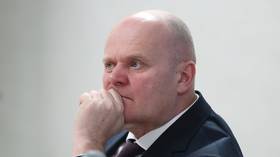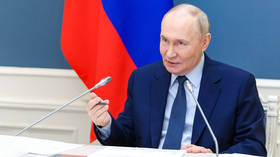Telegram boss blasts France’s ‘unprecedented’ case against him

Telegram founder Pavel Durov has called the criminal case against him in France unfair and baseless. In an interview with American journalist Tucker Carlson, the Russian-born billionaire argued that he shouldn’t be blamed for crimes committed by users on his messenger service.
Durov, whose company is based in Dubai, was arrested in France in August 2024 on charges of complicity in crimes allegedly committed by Telegram users, including extremism and child abuse. He was later released on bail of €5 million ($5.46 million). Although he was permitted to travel to the UAE in March, his recent request to visit the US has been denied, and he remains under restricted supervision.
Duvov said he is “still confused” by the accusations. “At first they said, ‘Oh, you failed to respond to our legal requests and that's why you're complicit…’ But it’s not true that we didn’t respond to legally binding legal requests,” the Telegram owner explained.
He went on to say that the French judicial system has a “very extensive interpretation of complicity,” and that his lawyers said the case is “quite unprecedented.”
“They had a couple of really small niche apps that are like 10,000 smaller than Telegram,” he added.
“I realized that it's not something I did, it’s something other people did using the app I created, Telegram, which is used by a billion people.”
The Telegram CEO agreed with Carlson that arresting him is like putting US President Donald Trump in jail over something that another American citizen has done. He stressed that, as the platform’s owner, he can’t be held responsible for something that one of the app’s users does.
After Durov's arrest, the encrypted messaging service updated its privacy policy to allow the collection of metadata – such as IP addresses, device information, and username changes – for up to one year. According to the policy, this data can be shared with the “relevant judicial authorities” if a user is suspected of engaging in illicit activities.
Late last year, Telegram channels belonging to major Russian news outlets were rendered inaccessible across the EU. Durov criticized the move, saying the bloc imposes more censorship and media restrictions than Russia.













